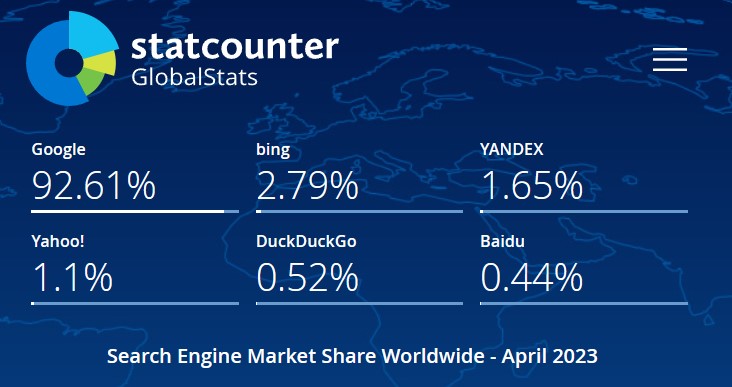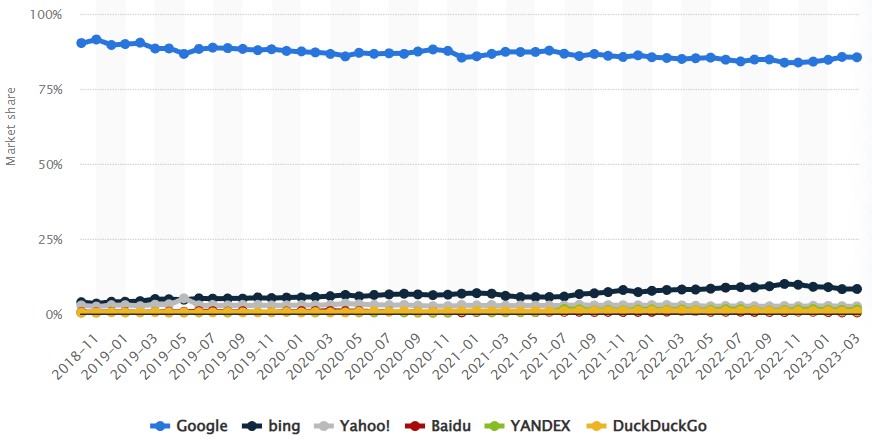Earlier this year, Microsoft unveiled its revamped version of Bing, deeply integrated with ChatGPT. The hype was palpable, and errors in Google’s own similar efforts actually managed to dent the search giant’s share price temporarily, as its dominance in search seemed threatened for the first time in decades. Alas, according to at least a couple of research firms, it seems that Bing is still struggling to find mass market adoption.
Bing Chat allows users to search via natural language, but it is often criticized by content creators for the way it simply regurgitates existing content, offering only a small link citation as compensation for the work of human writers. Bing Chat offers a way to search for and digest information more succinctly than many websites offer, although it potentially comes at the price of reducing the business viability of offering free content on the web. Bing Chat and similar services have the potential to vacuum traffic, replacing search engines’ roles as middle-man. If Bing manages to damage the sites that produce the content that trains its AI, it could ironically end up dumber as a result. As of right now, however, it seems that the adoption of Microsoft’s brand of ChatGPT is fairly slow.
Stat Counter is one service that tracks browser market share, and as you can see below, it paints a pretty bleak picture for Bing. Bing’s market share according to the service hovers around 2.5%, and hasn’t increased meaningfully since the advent of Bing Chat.

The full counter effectively shows Bing’s market share as completely flat, hovering around 2.5% over the past few months, with no visible change between now and January 2023. That doesn’t mean interest in generative AI content is low, however.
ChatGPT on OpenAI itself hit millions of users more rapidly than services like Instagram and even TikTok. The capabilities it offers have truly immeasurable potential for all sorts of domestic and industry roles, with vast concerns about how it could disrupt labor markets in the coming years ahead.
Another analytics firm, Statista, offered a slightly more rosy picture of Bing’s adoption in recent years. According to Statista, Bing has been trending upwards against Google over the past few years. However, Statista seems to suggest that Bing actually lost market share against Google over the past few months.

It’s hard to know for certain exactly how accurate the stats above are. Only Microsoft and Google know for sure exactly how many users their respective services are getting at any given time, but the trends are likely accurate. Bing has historically struggled to gain market acceptance versus Google, owing to Google’s entrenched mindshare and oft-superior services and results. Google’s mapping tools are far more comprehensive than Microsoft’s, and Google’s attention to local search results helps it win on the global stage. Microsoft’s Bing service enjoys a better market share in the United States than in most regions, but by most metrics, even that seems to be within the single-digit range. Could Microsoft’s fortunes change in the future?
Microsoft has opened its Bing Chat AI service to the public, no longer requiring a waiting list. This could impact results down the line, but the current trends above aren’t exactly encouraging. Reportedly, ChatGPT costs an eyewatering $700,000 dollars to run per day, putting a question mark on the long-term business viability of the service.
Either way, Microsoft is going heavy on AI services and systems, baking Bing ChatGPT into various products. Microsoft also announced an investment in British AI start-up Builder.AI today, which offers co-pilot-like services to build apps and websites using natural language, in lieu of coding knowledge. Don’t expect the AI hype train to wind down any time soon.




